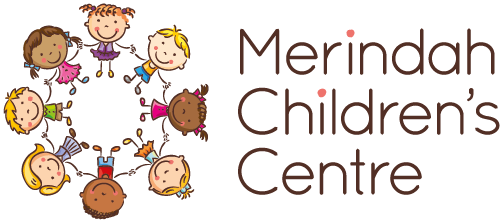Our Philosophies and Vision
Our Children’s Philosophy
At Merindah children’s Centre, our children collectively believe that:
Merindah is a place to belong:
“Yep. I belong at Preschool, and at home. You feel good.”
“I belong in Australia. You love everybody. I belong here.”
“Yep I feel very (belonging)”
They feel safe and secure:
“I don’t cry anymore. I like preschool” “The teacher’s help us. They give us a cuddle if we get hurt” “The teacher’s play with us”
They develop positive dispositions for learning:
“Building, making and experiments”
They establish and maintain respectful relationships:
“You take care of friends”
They engage with nature:
“Learn about dirt and water”
They participate in a variety of rich and meaningful experiences:
“There’s so many interesting things to do” “There’s lots of toys”
They relax and be happy:
“I like the thing in the corner (the cube)” “I feel happy at preschool”
As respectful adults, we value the voice of each child and embed their right to be heard through their philosophy
Developed and adopted July 2018
Service Philosophy
“We acknowledge the traditional indigenous custodians of the land on which we work, learn and play. We honour and recognise the strength, resilience and determination of the Aboriginal and Torres Strait Islander people and support the ongoing process reconciliation through platforms of social justice”
At Merindah Children’s Centre we strive to embed a culture of belonging as the key to delivering the highest quality early childhood education and care. We believe that belonging is central to our philosophy.
Our philosophy is based on international evidence that early childhood is a vital period for children’s learning and development. Therefore, we strive to deliver the best possible 21stCentury education designed and delivered within a play-based curriculum. We recognise that children’s early relationships and learning influences their future success and encourages a positive attitude toward lifelong learning.
We believe that each child is a capable, competent and creative individual who is an active and informed citizen. We respectfully recognise that all families are diverse in their beliefs and culture. Furthermore, we believe that learning should be rich in diversity, inclusive and advocates for the rights of each and every child.
We strive to work in partnership with families to extend on what children know, can do and understand. We believe that learning should be co-constructed with children emerging from their own ideas, interests, strengths, abilities and culture supported by responsive educators who are intentional in their curriculum decision making.
We strongly value connections with families and recognise that parents are the most influential people in their children’s lives. We continually strive to promote a welcoming environment that builds on each family member’s sense of belonging to establish and maintain rich ongoing reciprocal relationships.
We aim to promote a culture of belonging to the community through our engagement with schools, the local library, elders, sustainable initiatives, early childhood networks, family wellbeing and support agencies.
We pride ourselves as early childhood professionals who respect each other as unique contributors within our reflective and visionary team.
Our service community will be guided at all times by the United Nations Convention on the Rights of the Child (1990), Declaration of the Rights of Indigenous Peoples (2007), Early Childhood Code of Ethics (2016), National Quality Framework and all Australian early education and care legislation.
Reviewed, updated & adopted July 2018.
Centre Vision
At Merindah Children’s Centre we aim to:
1.Support all young Australians become:
- Successful learners
- Confident and creative individuals
- Active and informed citizens.
- Improved outcomes for Aboriginal and Torres Strait Islander young people.
by embracing ‘Being, Becoming Belonging: The Early Years Learning Framework for Australia” (DEEWR, 2009).
- Build meaningful, respectful and reciprocal relationships with all families and children where all feel that they belong to the service community.
- Celebrate the difference, diversity and knowledge of all families, children and educators regardless of background.
- Provide an environment which promotes a sense of belonging and learning through play.
- Promote holistic learning for children to develop:
- :Children have a strong sense of identity
- : Children are connected with and contribute to their world
- : Children have a strong sense of wellbeing
- : Children are confident and involved learners
- :Children are effective communicators
- Further promote involvement and awareness of the wider community
- Further encourage a respect of the natural environment and sustainable living
- Further engage children in learning that places an awareness and appreciation of Australian indigenous culture toward the process of reconciliation.
Updated and adopted: July 2018
